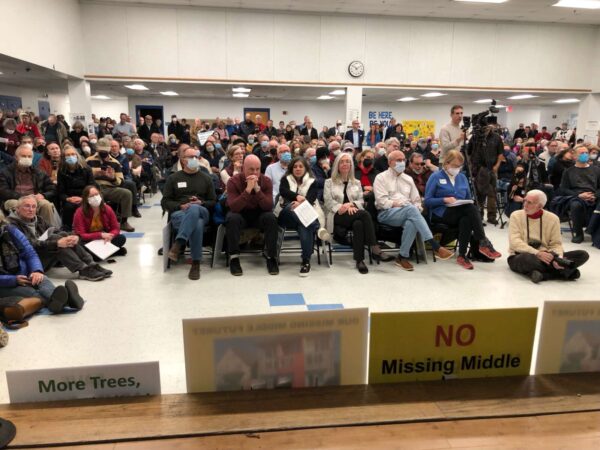
Several hundred people gathered early Sunday afternoon at Innovation Elementary School for what was dubbed the “Reality Check Rally.”
As others were glued to their TVs for the last day of the NFL regular season and its playoff implications — or going about errands, children’s activities, or jobs — the attendees spent their afternoon hearing a dire picture being painted about the proposal to allow multifamily housing of up to 8 units per property in single-family home neighborhoods, also known as Missing Middle.
As outlined in a press release from organizers Arlingtonians for Upzoning Transparency and Arlingtonians for Our Sustainable Future, plan critics are concerned that it will “accelerate gentrification, reducing Arlington’s diversity; displace moderate-and low-income households, including seniors, persons with disabilities and renters; raise property values and taxes; reduce tree canopy and greenspace; and further overload schools, infrastructure and services.”
Of course, not everyone agrees.
A handful of Missing Middle supporters also showed up at the event, according to Patch, including those representing the Arlington branch of the NAACP. Supporters have also showed up to pivotal County Board meetings, albeit not in the numbers seen at Sunday’s rally.
Meanwhile, in November’s County Board election, the two candidates supportive of Missing Middle to various degrees — incumbent Matt de Ferranti and independent Adam Theo — took about 71% of the vote to 28% for independent Audrey Clement, who based her campaign around her opposition to Missing Middle.
The Missing Middle debate in Arlington is a particularly pitched version of debates that often play out here and elsewhere across the country, particularly when it comes to proposals to build infrastructure, build new housing, or change the physical built environment in general.
It raises the question of just how local governments should handle such opposition.
Often, opponents of such projects will make the case that their numbers, their passion, and their arguments should be enough to put a stop to what they’re protesting, or at least to grant additional time for more studies and community input. (An online petition against Missing Middle in Arlington has more than 5,000 virtual signatures.)
On the other hand, those who are supportive of building — more housing, in particular — have been saying that there is a well-formed playbook for stopping things from being built and that elected officials should not be so quick to grant those with the loudest voices and largest crowds what they want. They argue that there is a mostly silent majority that’s okay with things being built — a group that does not have the time, desire nor, in some cases, economic ability to wage a support campaign to counter the opposition.
I’ve been really compelled recently by Leonora’s idea to do “community input” for housing/planning through a (mostly) randomly selected, paid, and time-boxed group.
Community input should be more like jury duty, and less like the Nextdoor comments section at Black Friday sales. https://t.co/njrQjGuG3F
— fry (@anniefryman) October 24, 2022
It’s difficult to boil this very fundamental debate about the role of local government and community input — a county-specific form of which is known as the Arlington Way — into a concise poll. But today we’re going to try!
In general terms, how pivotal should community input be to county decision making, when there’s a large contingent that opposes a given proposal?

